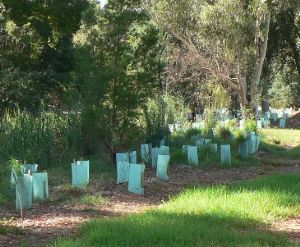Guarding seedlings can make a significant difference to planting success. Whether its plant eaters, excesses of temperature or wind that cause plant damage, there is a guard to suit the purpose.
Unfortunately, plant guards have in recent decades, like so many other things we use, been manufactured almost exclusively using plastic. As has become obvious across the world, this is an issue for the very environments we are working to improve.
Locally, green plastic ‘sleeve’ and coreflute guards can often be found drifting across the countryside and lodged in flood debris. Even the guards that look like carboard milk cartons have a thin film of protective plastic. This eventually becomes plastic pollution as the cardboard breaks down in the environment.
Here at Parklands re-use, until the last possible use is had, has always been our approach. We find that coreflute guards, if removed and stored as soon as plants are sturdy enough, can be re-used at least 4 times.
In recent years guard suppliers have responded to the plastic crisis and are starting to offer non-plastic alternatives. Uncoated cardboard guards are now available that offer good protection from temperature and wind, breaking down in 12 to 18 months. Bulk suppliers like Suregro and Growise and are all busy developing new biodegradable products.
In the meantime, Melbourne based suppliers have created recycling pathways for plastic guards that previously went to landfill. Melbourne based company Suregro Treemax have started a Greencycle program, recycling green plastic sleeves, black plastic mesh and coreflute guards. As a polypropylene product, coreflute is a Group 5 recyclable plastic. Corex in Melbourne recycle clean coreflute, including used coreflute tree guards. In both cases, we just need to get our old guards there, in relatively clean condition.






